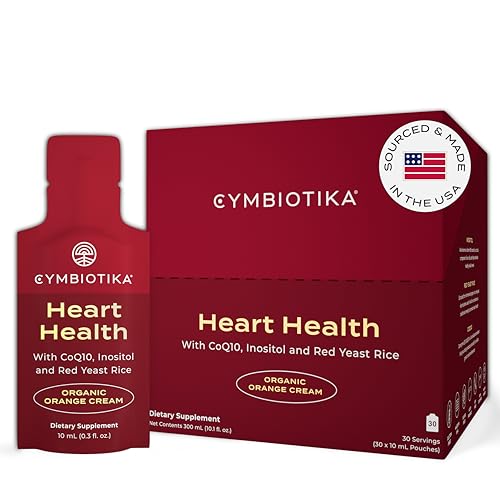

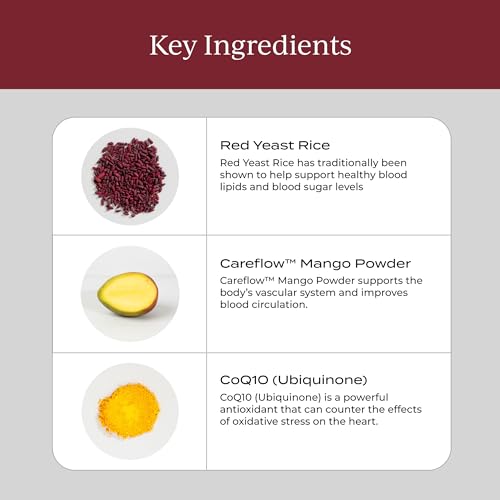
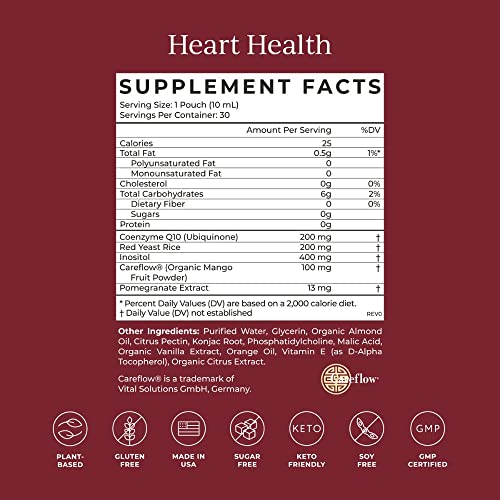

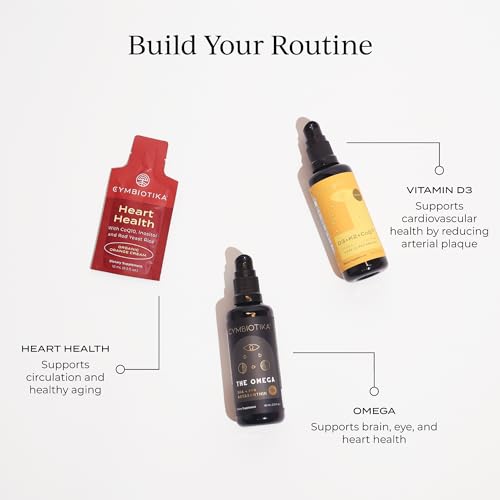
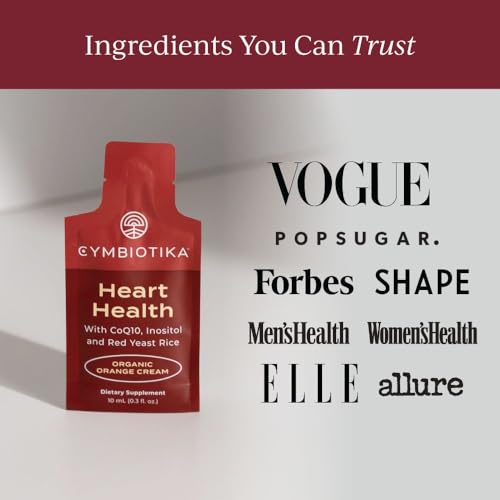
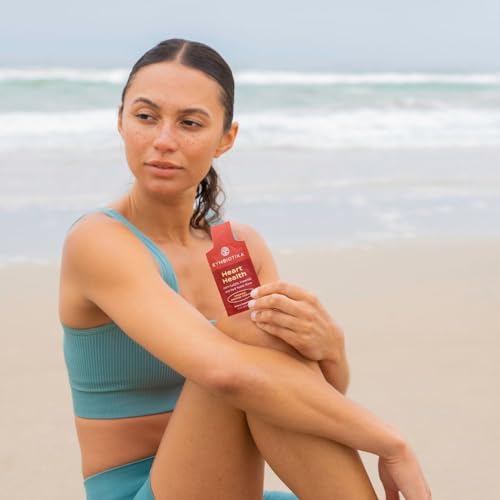

CYMBIOTIKA Heart Health Supplement - Supports Circulation & Aging, Organic Orange Cream - 30 Pack


Malic Acid
High RiskMalic acid is a naturally occurring organic acid found in various fruits, particularly apples. It plays a role in the metabolic processes of living organisms and is commonly used as a flavoring agent, pH regulator, and preservative in food and cosmetic products.
Sustai Insights
Malic acid serves as an effective pH adjuster and flavor enhancer, contributing to the sensory profile of products. However, it may cause skin and eye irritation and has high use restrictions, limiting its application. Regulatory bodies have noted these concerns, leading to restrictions on its use in certain products. Overall, the ingredient is considered high risk due to these factors, necessitating careful usage and consideration of safer alternatives.
Ubiquinone
Medium RiskUbiquinone, also known as coenzyme Q10, is a naturally occurring antioxidant found in the body, primarily in the mitochondria. It plays a crucial role in energy production and is commonly used in skincare and dietary supplements for its potential health benefits and ability to support cellular function.
Sustai Insights
Ubiquinone provides functional benefits as an antioxidant, aiding in energy production and skin health. It is generally considered safe, with low risks for carcinogenicity, allergies, and immunotoxicity, although moderate concerns exist regarding developmental and reproductive toxicity and certain usage restrictions. Environmental impacts are minimal, with no significant bioaccumulation noted. Regulatory bodies do not impose severe restrictions, but users should adhere to recommended concentrations. Overall, this ingredient presents a medium risk level, and alternatives like alpha-lipoic acid may be considered for those seeking different antioxidant options.
Lecithin
Medium RiskLecithin is a naturally occurring lipid found in various plant and animal tissues, primarily composed of phospholipids. It serves as an emulsifier, stabilizing mixtures of oil and water, and is commonly used in food, cosmetics, and pharmaceuticals to improve texture and extend shelf life.
Sustai Insights
Lecithin provides functional benefits as an effective emulsifier and stabilizer, enhancing product texture while being sustainably sourced from natural origins. Health risks are generally low, with moderate concerns regarding allergies and immunotoxicity but minimal cancer or reproductive toxicity risks. Environmental hazards are limited, and it is not classified as a pollutant. Regulatory bodies impose few restrictions. Overall, lecithin presents a medium risk, suggesting caution in usage, especially for sensitive individuals. Alternatives include sunflower lecithin or other plant-based emulsifiers that may offer similar benefits with reduced allergenic potential.
Punica Granatum (Pomegranate) Extract
Low RiskPunica granatum (pomegranate) extract is derived from the fruit of the pomegranate. It is commonly used in cosmetic formulations for its antioxidant properties and is believed to support skin health.
Sustai Insights
Pomegranate extract offers functional benefits such as antioxidant protection and skin conditioning. It is considered low risk regarding health concerns, with minimal potential for carcinogenicity, allergies, and reproductive toxicity. Environmental impact appears low, with no significant pollutant or bioaccumulation potential. Regulatory bodies do not impose restrictions on its use. Safe usage practices should be followed, though no significant alternatives are noted. Overall, the ingredient is assessed as low risk.
Vegetarian Glycerin
Low RiskVegetarian glycerin, also known as glycerol, is a colorless, odorless, and viscous liquid derived from plant sources. It is primarily used as a humectant, solvent, and emollient in various personal care products, helping to retain moisture and improve texture.
Sustai Insights
Vegetarian glycerin offers functional benefits as an effective humectant, promoting hydration and skin smoothness. It is biodegradable and typically sustainably sourced. Health risks associated with glycerin are low, with no significant concerns for carcinogenicity, allergens, or reproductive toxicity. Environmental risks are minimal, and it is not subject to major regulatory warnings. Overall, the risk level for this ingredient is low, making it a safe choice in formulations. Safe usage practices include ensuring proper concentrations in products, and alternatives such as propylene glycol exist but may have differing properties.
Tocopherol, D Alpha
Low RiskTocopherol, specifically d-alpha tocopherol, is a naturally occurring form of Vitamin E. It is commonly used in cosmetic and personal care products primarily for its antioxidant properties, helping to protect formulations from oxidation and extend shelf life.
Sustai Insights
D-alpha tocopherol provides effective antioxidant benefits, contributing to product stability. It is sustainably sourced and generally regarded as safe, with low concerns regarding carcinogenicity, allergies, and reproductive toxicity. However, there are minor concerns about endocrine disruption. Regulatory bodies have not imposed significant restrictions, indicating low overall risk. Recommended usage practices include adhering to established safe concentration thresholds. Alternatives, such as other forms of Vitamin E or plant-based antioxidants, may also be considered.
Apple Pectin
Low RiskApple pectin is a natural polysaccharide found in the cell walls of apples. It is commonly used as a gelling agent, thickener, and stabilizer in food products, as well as in cosmetics and pharmaceuticals. Its gelling properties are utilized to improve texture and consistency.
Sustai Insights
Apple pectin serves as an effective thickener and stabilizer, contributing to the texture of various products. It is biodegradable and derived from renewable sources, enhancing its sustainability profile. Health risks are minimal, with low concerns for carcinogenicity, allergies, or reproductive toxicity. Environmental impact is also low, with no known pollutants or bioaccumulation issues. Regulatory status is clear, with no current restrictions. Overall, the risk level associated with apple pectin is low, making it a safe ingredient for use in formulations.
Inositol
Low RiskInositol is a cyclic polyol, a type of sugar alcohol. It plays a crucial role in cellular signaling and is often included in dietary supplements and cosmetic formulations for its potential benefits related to skin health and metabolic function.
Sustai Insights
Inositol is recognized for its functional benefits, including promoting cellular health and potentially aiding in metabolic processes. It is not associated with significant health risks such as carcinogenicity or allergenic reactions, and regulatory bodies have not placed restrictions on its use. No notable environmental hazards or pollutant concerns have been identified, leading to an overall low-risk assessment. Safe usage practices are generally recommended, and while alternatives exist, inositol remains a viable option with low adverse effects.
Punica Granatum (Pomegranate) Extract
Low RiskPunica granatum (pomegranate) extract is derived from the fruit of the pomegranate. It is commonly used in cosmetic formulations for its antioxidant properties and is believed to support skin health.
Sustai Insights
Pomegranate extract offers functional benefits such as antioxidant protection and skin conditioning. It is considered low risk regarding health concerns, with minimal potential for carcinogenicity, allergies, and reproductive toxicity. Environmental impact appears low, with no significant pollutant or bioaccumulation potential. Regulatory bodies do not impose restrictions on its use. Safe usage practices should be followed, though no significant alternatives are noted. Overall, the ingredient is assessed as low risk.
Ubiquinone
Medium RiskUbiquinone, also known as coenzyme Q10, is a naturally occurring antioxidant found in the body, primarily in the mitochondria. It plays a crucial role in energy production and is commonly used in skincare and dietary supplements for its potential health benefits and ability to support cellular function.
Sustai Insights
Ubiquinone provides functional benefits as an antioxidant, aiding in energy production and skin health. It is generally considered safe, with low risks for carcinogenicity, allergies, and immunotoxicity, although moderate concerns exist regarding developmental and reproductive toxicity and certain usage restrictions. Environmental impacts are minimal, with no significant bioaccumulation noted. Regulatory bodies do not impose severe restrictions, but users should adhere to recommended concentrations. Overall, this ingredient presents a medium risk level, and alternatives like alpha-lipoic acid may be considered for those seeking different antioxidant options.
Vegetarian Glycerin
Low RiskVegetarian glycerin, also known as glycerol, is a colorless, odorless, and viscous liquid derived from plant sources. It is primarily used as a humectant, solvent, and emollient in various personal care products, helping to retain moisture and improve texture.
Sustai Insights
Vegetarian glycerin offers functional benefits as an effective humectant, promoting hydration and skin smoothness. It is biodegradable and typically sustainably sourced. Health risks associated with glycerin are low, with no significant concerns for carcinogenicity, allergens, or reproductive toxicity. Environmental risks are minimal, and it is not subject to major regulatory warnings. Overall, the risk level for this ingredient is low, making it a safe choice in formulations. Safe usage practices include ensuring proper concentrations in products, and alternatives such as propylene glycol exist but may have differing properties.
Lecithin
Medium RiskLecithin is a naturally occurring lipid found in various plant and animal tissues, primarily composed of phospholipids. It serves as an emulsifier, stabilizing mixtures of oil and water, and is commonly used in food, cosmetics, and pharmaceuticals to improve texture and extend shelf life.
Sustai Insights
Lecithin provides functional benefits as an effective emulsifier and stabilizer, enhancing product texture while being sustainably sourced from natural origins. Health risks are generally low, with moderate concerns regarding allergies and immunotoxicity but minimal cancer or reproductive toxicity risks. Environmental hazards are limited, and it is not classified as a pollutant. Regulatory bodies impose few restrictions. Overall, lecithin presents a medium risk, suggesting caution in usage, especially for sensitive individuals. Alternatives include sunflower lecithin or other plant-based emulsifiers that may offer similar benefits with reduced allergenic potential.
Tocopherol, D Alpha
Low RiskTocopherol, specifically d-alpha tocopherol, is a naturally occurring form of Vitamin E. It is commonly used in cosmetic and personal care products primarily for its antioxidant properties, helping to protect formulations from oxidation and extend shelf life.
Sustai Insights
D-alpha tocopherol provides effective antioxidant benefits, contributing to product stability. It is sustainably sourced and generally regarded as safe, with low concerns regarding carcinogenicity, allergies, and reproductive toxicity. However, there are minor concerns about endocrine disruption. Regulatory bodies have not imposed significant restrictions, indicating low overall risk. Recommended usage practices include adhering to established safe concentration thresholds. Alternatives, such as other forms of Vitamin E or plant-based antioxidants, may also be considered.
Apple Pectin
Low RiskApple pectin is a natural polysaccharide found in the cell walls of apples. It is commonly used as a gelling agent, thickener, and stabilizer in food products, as well as in cosmetics and pharmaceuticals. Its gelling properties are utilized to improve texture and consistency.
Sustai Insights
Apple pectin serves as an effective thickener and stabilizer, contributing to the texture of various products. It is biodegradable and derived from renewable sources, enhancing its sustainability profile. Health risks are minimal, with low concerns for carcinogenicity, allergies, or reproductive toxicity. Environmental impact is also low, with no known pollutants or bioaccumulation issues. Regulatory status is clear, with no current restrictions. Overall, the risk level associated with apple pectin is low, making it a safe ingredient for use in formulations.
Inositol
Low RiskInositol is a cyclic polyol, a type of sugar alcohol. It plays a crucial role in cellular signaling and is often included in dietary supplements and cosmetic formulations for its potential benefits related to skin health and metabolic function.
Sustai Insights
Inositol is recognized for its functional benefits, including promoting cellular health and potentially aiding in metabolic processes. It is not associated with significant health risks such as carcinogenicity or allergenic reactions, and regulatory bodies have not placed restrictions on its use. No notable environmental hazards or pollutant concerns have been identified, leading to an overall low-risk assessment. Safe usage practices are generally recommended, and while alternatives exist, inositol remains a viable option with low adverse effects.
Malic Acid
High RiskMalic acid is a naturally occurring organic acid found in various fruits, particularly apples. It plays a role in the metabolic processes of living organisms and is commonly used as a flavoring agent, pH regulator, and preservative in food and cosmetic products.
Sustai Insights
Malic acid serves as an effective pH adjuster and flavor enhancer, contributing to the sensory profile of products. However, it may cause skin and eye irritation and has high use restrictions, limiting its application. Regulatory bodies have noted these concerns, leading to restrictions on its use in certain products. Overall, the ingredient is considered high risk due to these factors, necessitating careful usage and consideration of safer alternatives.
Cymbiotika’s Heart Health Supplement is designed to support cardiovascular wellness and promote overall vitality. This advanced formula combines traditional ingredients with modern science to help maintain a healthy heart and improve circulation.
- Enhanced Absorption: Liposomal technology ensures optimal nutrient delivery.
- Heart Support: Red Yeast Rice may assist in lowering blood sugar levels.
- Circulation Boost: Careflow Mango Powder promotes healthy blood flow.
- Easy to Use: Convenient pouches can be consumed directly or mixed.
- Clean Ingredients: Vegan, gluten-free, and free from harmful additives.
- Trusted Brand: Formulated with a commitment to quality and safety.
- Daily Wellness: One pouch a day supports your heart health journey.
Subscribe & Save with Sustai
- Best Price Guarantee: Always enjoy the lowest prices on sustainable home essentials.
- No Surprises: We’ll notify you before shipping. No hidden fees, ever.
- You’re in Charge: Change, pause, or cancel your subscription anytime with ease.
- Eco-Friendly Deliveries: Our grouped shipments mean less packaging and lower emissions.
Join us on a sustainable journey. Special offers for a limited time! Prices and promotions may change.
Recommended Products
Cymbiotika’s Heart Health Supplement is designed to support cardiovascular wellness and promote overall vitality. This advanced formula combines traditional ingredients with modern science to help maintain a healthy heart and improve circulation.
- Enhanced Absorption: Liposomal technology ensures optimal nutrient delivery.
- Heart Support: Red Yeast Rice may assist in lowering blood sugar levels.
- Circulation Boost: Careflow Mango Powder promotes healthy blood flow.
- Easy to Use: Convenient pouches can be consumed directly or mixed.
- Clean Ingredients: Vegan, gluten-free, and free from harmful additives.
- Trusted Brand: Formulated with a commitment to quality and safety.
- Daily Wellness: One pouch a day supports your heart health journey.

You can have at most 2 Sustainable Steals products in your cart
Customer Reviews
Customers’ View
Customers appreciate the effectiveness and natural formulation of Cymbiotika’s Heart Health Supplement. Many users report positive experiences regarding its potential to support cholesterol management and overall heart health. A common sentiment is that the product, which is vegan and gluten-free, contains high-quality ingredients that align with health-conscious values. Users have expressed satisfaction with its pleasant taste and ease of use, noting it can be consumed directly or added to other foods. Overall, customers find this supplement to be a beneficial addition to their wellness routine, particularly for those seeking to lower cholesterol levels naturally.
AI-generated from the text of customer reviewsThis product has no reviews yet.




